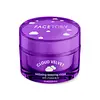What's inside
What's inside
 Key Ingredients
Key Ingredients

 Benefits
Benefits

 Concerns
Concerns

 Ingredients Side-by-side
Ingredients Side-by-side

Water
Skin ConditioningPanthenol
Skin ConditioningGlycerin
HumectantButylene Glycol
HumectantPropylene Glycol
HumectantHydrogenated Poly(C6-14 Olefin)
EmollientAmmonium Acryloyldimethyltaurate/Vp Copolymer
Carbomer
Emulsion StabilisingPolyglyceryl-3 Methylglucose Distearate
EmulsifyingArginine
MaskingEthylhexylglycerin
Skin ConditioningGlyceryl Acrylate/Acrylic Acid Copolymer
HumectantSodium Phytate
Hydrolyzed Gardenia Florida Extract
AntioxidantMaltodextrin
AbsorbentAllantoin
Skin ConditioningAdenosine
Skin ConditioningBetaine
HumectantGluconolactone
Skin ConditioningTocopherol
AntioxidantGalactomyces Ferment Filtrate
HumectantButyrospermum Parkii Butter
Skin ConditioningCaprylic/Capric Triglyceride
MaskingOlea Europaea Fruit Oil
MaskingHydrogenated Lecithin
EmulsifyingSqualane
EmollientBacillus Ferment
Skin ConditioningBifida Ferment Filtrate
Skin ConditioningLactobacillus Ferment
Skin ConditioningLactobacillus Ferment Lysate
Skin ConditioningLactobacillus/Soybean Ferment Extract
Skin ConditioningLeuconostoc/Radish Root Ferment Filtrate
AntimicrobialLactobacillus/Pear Juice Ferment Filtrate
Skin ConditioningLactobacillus/Punica Granatum Fruit Ferment Extract
Skin ConditioningLactococcus Ferment
Skin ConditioningLactococcus Ferment Extract
Skin ConditioningSodium Hyaluronate
HumectantBeta-Glucan
Skin ConditioningCeramide NP
Skin ConditioningCholesterol
EmollientHydrolyzed Hyaluronic Acid
HumectantPhytosphingosine
Skin ConditioningSodium Acetylated Hyaluronate
HumectantAcetyl Hexapeptide-8
HumectantGlutathione
Oligopeptide-29
AntioxidantOligopeptide-32
AntiseborrhoeicPalmitoyl Pentapeptide-4
Skin ConditioningPalmitoyl Tripeptide-1
Skin ConditioningWater, Panthenol, Glycerin, Butylene Glycol, Propylene Glycol, Hydrogenated Poly(C6-14 Olefin), Ammonium Acryloyldimethyltaurate/Vp Copolymer, Carbomer, Polyglyceryl-3 Methylglucose Distearate, Arginine, Ethylhexylglycerin, Glyceryl Acrylate/Acrylic Acid Copolymer, Sodium Phytate, Hydrolyzed Gardenia Florida Extract, Maltodextrin, Allantoin, Adenosine, Betaine, Gluconolactone, Tocopherol, Galactomyces Ferment Filtrate, Butyrospermum Parkii Butter, Caprylic/Capric Triglyceride, Olea Europaea Fruit Oil, Hydrogenated Lecithin, Squalane, Bacillus Ferment, Bifida Ferment Filtrate, Lactobacillus Ferment, Lactobacillus Ferment Lysate, Lactobacillus/Soybean Ferment Extract, Leuconostoc/Radish Root Ferment Filtrate, Lactobacillus/Pear Juice Ferment Filtrate, Lactobacillus/Punica Granatum Fruit Ferment Extract, Lactococcus Ferment, Lactococcus Ferment Extract, Sodium Hyaluronate, Beta-Glucan, Ceramide NP, Cholesterol, Hydrolyzed Hyaluronic Acid, Phytosphingosine, Sodium Acetylated Hyaluronate, Acetyl Hexapeptide-8, Glutathione, Oligopeptide-29, Oligopeptide-32, Palmitoyl Pentapeptide-4, Palmitoyl Tripeptide-1
Water
Skin ConditioningDecyl Glucoside
CleansingGlycerin
HumectantCocamidopropyl Betaine
CleansingButylene Glycol
HumectantLauric Acid
CleansingSodium Lauroyl Glutamate
Polysorbate 20
EmulsifyingDiglycerin
HumectantAminomethyl Propanol
BufferingParfum
MaskingBetaine
HumectantPhenoxyethanol
PreservativeSodium Chloride
MaskingCaprylyl Glycol
EmollientPropylene Glycol
HumectantCocoyl Methyl Glucamide
Skin ConditioningPolyquaternium-10
Ethylhexylglycerin
Skin ConditioningHexylene Glycol
EmulsifyingNiacinamide
SmoothingInulin
Skin ConditioningDisodium EDTA
Alpha-Glucan Oligosaccharide
CleansingMagnolia Biondii Bud/Flower Extract
Skin ConditioningCapric Acid
CleansingMyristic Acid
CleansingSorbic Acid
PreservativePaeonia Officinalis Flower Extract
TonicPotassium Sorbate
PreservativeSodium Benzoate
MaskingCamellia Sinensis Leaf Extract
AntimicrobialWater, Decyl Glucoside, Glycerin, Cocamidopropyl Betaine, Butylene Glycol, Lauric Acid, Sodium Lauroyl Glutamate, Polysorbate 20, Diglycerin, Aminomethyl Propanol, Parfum, Betaine, Phenoxyethanol, Sodium Chloride, Caprylyl Glycol, Propylene Glycol, Cocoyl Methyl Glucamide, Polyquaternium-10, Ethylhexylglycerin, Hexylene Glycol, Niacinamide, Inulin, Disodium EDTA, Alpha-Glucan Oligosaccharide, Magnolia Biondii Bud/Flower Extract, Capric Acid, Myristic Acid, Sorbic Acid, Paeonia Officinalis Flower Extract, Potassium Sorbate, Sodium Benzoate, Camellia Sinensis Leaf Extract
Ingredients Explained
These ingredients are found in both products.
Ingredients higher up in an ingredient list are typically present in a larger amount.
Betaine is a common humectant (a substance that promotes retention of moisture). It's known to be gentle on the skin and can help balance hydration.
This ingredient is best for improving hydration and soothing irritated skin. Studies also show it helps even out skin tone.
Fun fact: Betaine is naturally created in the skin and body. The kind found within cosmetic products can be either plant-derived or synthetic.
Another name for betaine is trimethylglycine.
Learn more about BetaineButylene Glycol (or BG) is used within cosmetic products for a few different reasons:
Overall, Butylene Glycol is a safe and well-rounded ingredient that works well with other ingredients.
Though this ingredient works well with most skin types, some people with sensitive skin may experience a reaction such as allergic rashes, closed comedones, or itchiness.
Learn more about Butylene GlycolEthylhexylglycerin (we can't pronounce this either) is commonly used as a preservative and skin softener. It is derived from glyceryl.
You might see Ethylhexylglycerin often paired with other preservatives such as phenoxyethanol. Ethylhexylglycerin has been found to increase the effectiveness of these other preservatives.
Glycerin is already naturally found in your skin. It helps moisturize and protect your skin.
A study from 2016 found glycerin to be more effective as a humectant than AHAs and hyaluronic acid.
As a humectant, it helps the skin stay hydrated by pulling moisture to your skin. The low molecular weight of glycerin allows it to pull moisture into the deeper layers of your skin.
Hydrated skin improves your skin barrier; Your skin barrier helps protect against irritants and bacteria.
Glycerin has also been found to have antimicrobial and antiviral properties. Due to these properties, glycerin is often used in wound and burn treatments.
In cosmetics, glycerin is usually derived from plants such as soybean or palm. However, it can also be sourced from animals, such as tallow or animal fat.
This ingredient is organic, colorless, odorless, and non-toxic.
Glycerin is the name for this ingredient in American English. British English uses Glycerol/Glycerine.
Learn more about GlycerinPropylene Glycol is an odorless, colorless liquid. As a humectant, it helps skin retain moisture. It also aids in delivering active ingredients.
Another role of this ingredient is preventing a product from melting or freezing. Propylene glycol also adds antimicrobrial properties to a product, elongating product lifespan.
This ingredient is considered an organic alcohol and commonly added into both cosmetics and foods.
Those with sensitive skin or conditions may develop a rash when using this ingredient.
Learn more about Propylene GlycolWater. It's the most common cosmetic ingredient of all. You'll usually see it at the top of ingredient lists, meaning that it makes up the largest part of the product.
So why is it so popular? Water most often acts as a solvent - this means that it helps dissolve other ingredients into the formulation.
You'll also recognize water as that liquid we all need to stay alive. If you see this, drink a glass of water. Stay hydrated!
Learn more about Water